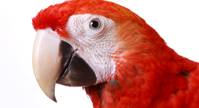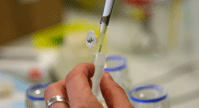Mycobacterium Avium Complex and Mycobacterium genavense
ANIMAL GENETICS OFFERS PCR TESTING FOR MYCOBACTERIUM SPECIES, AN INTERCELLULAR GRAM-POSITIVE BACTERIA THAT CAN CAUSE DISEASE IN BIRDS AND MAMMALS, INCLUDING HUMANS.
Description:
 Mycobacterium species are characterized by straight or slightly curved, non-motile rods, 0.20.6 x 1.0 µm in size. Although difficult to stain, Mycobacterium rods are classified as Gram-positive. After staining with basic fuchsin dye, cells resist decolorisation with acidicethanol and are therefore termed acidalcoholfast bacilli (AFB). This characteristic is due to the high level of lipid in mycobacterial cell walls.
Mycobacterium species are characterized by straight or slightly curved, non-motile rods, 0.20.6 x 1.0 µm in size. Although difficult to stain, Mycobacterium rods are classified as Gram-positive. After staining with basic fuchsin dye, cells resist decolorisation with acidicethanol and are therefore termed acidalcoholfast bacilli (AFB). This characteristic is due to the high level of lipid in mycobacterial cell walls.
There are seventy-one validly-named species of Mycobacterium and an additional three subspecies. The principal pathogens in the genus are M. bovis, M. leprae and M. tuberculosis but, in all, thirty-two species are known to be pathogenic to humans or animals. Species of Mycobacteria other than those listed above are often referred to as "atypical mycobacteria." The most commonly encountered pathogens among the atypical mycobacteria are species of the Mycobacterium avium complex. The M. avium complex (MAC) is considered to contain M. avium, M. avium subspecies paratuberculosis, M. avium subspecies silvaticum and M. intracellulare. However, poorly identified strains which show some similarity to M. avium are also frequently, and incorrectly, allocated to the complex. There are over 20 recognized serotypes within the M. avium complex.
Mycobacterium genavense, a reported cause of a wasting illness in patients with AIDS, was isolated from a parrot with acute onset respiratory distress and from tracheal tissue from a cervical lymph mode from a dog with severe hind limb weakness.
Most birds including Parrots, Parakeets, Cranes, Sparrows, Starlings, Emus, Waterfowl raptors and Softbills have shown susceptibly to M. avium. It is believed that in favorable conditions virtually all species of birds are susceptible to avian tuberculosis. It is most prevalent where there is a high population density, such as in zoos or in collections of birds.
Transmission:
Mycobacterium infections are considered to be "open," meaning infected birds consistently shed large amounts of organism into the environment.
Mycobacterium is transmitted by ingestion and inhalation of aerosolised infectious organisms from feces. Incubation in birds lasts weeks to years. Oral ingestion of food and water contaminated with feces is the most common method of infection. Once ingested, the organism spreads throughout the bird's body and is shed in large numbers in the feces. If the bacterium is inhaled, pulmonary lesions may develop. Skin invasion may occur as well. A spread via infected eggs can occur but it is not common.
The transmission of M. avium from human-to-human has not been convincingly demonstrated and all infections are thought to be environmental in origin.
Symptoms:
Symptoms vary depending on the following: species of Mycobacterium, bird or animal infected, age, and many other factors. In some cases, sudden death can occur in a bird with normal body weight and outer appearance. However, in most cases a bird infected with Mycobacterium will develop symptoms such as progressive weight loss (in spite of a good appetite), depression, diarrhoea, increased thirst, and respiratory difficulty. A decrease in egg production often occurs in birds that were laying eggs. Once the disease appears, it is virtually impossible to eradicate. Eventual death is the usual outcome.
Birds with the intestinal form often present with chronic wasting disease. In addition to this weight loss, depression, diarroea, increased urination (polyuria), abdominal distention, lameness and difficulty in breathing may be present.
Sample Type:
A postmortem qPCR testing of the liver, digestive tract, spleen and lungs is an effective way to diagnose the disease. For general screening of live birds, vent and throat swabs as well as biopsy tissue samples can be used.
Limitations:
As with any genetic test, new mutations may occur in the organism's genome that could affect the assay. Therefore, it may be difficult to detect all subtypes. Sample collection plays a pivotal part in the overall accuracy of the test, so please use caution and follow the instructions carefully.
Treatment:
Mycobacterium isolates that have been tested up to now are very resistant to the antituberculous drugs currently used in humans. Therefore, in most cases treatment is not considered a viable option in birds.
Submit a Sample for Testing:
To submit a sample download a test submission form at Downloads.
Cost per sample is $30.00. Please see our fee schedules below for bulk and combination rates.










